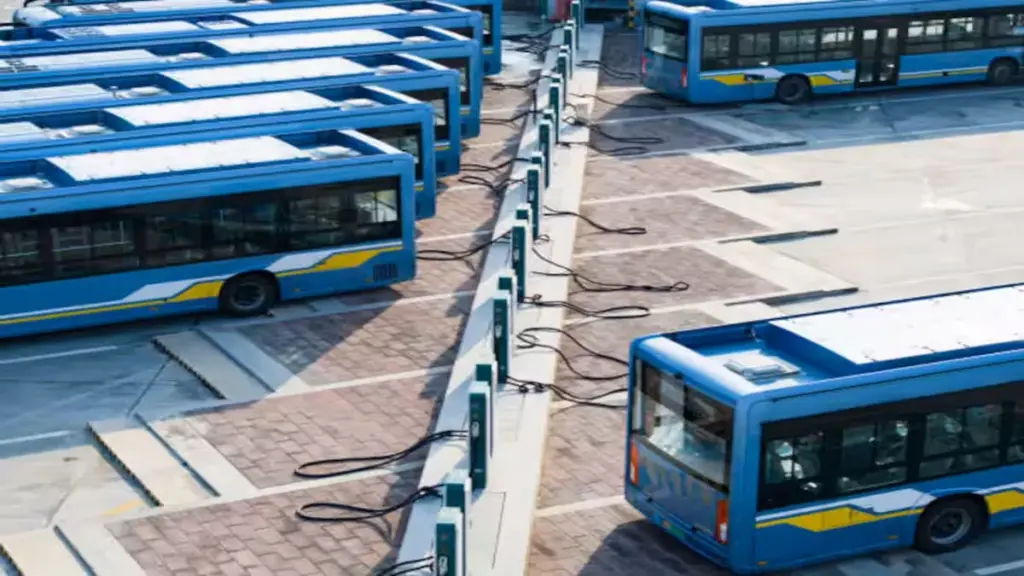Hurry up, Noida! Our city is taking a giant leap, green in colour this time, in public transportation. The Noida Authority has selected three possible names for its brand new electric bus (e-bus) service. All of this is part of a massive plan to introduce 500 e-buses on the city roads in the coming months. The titles — NGY Urban Mobility Service, GBN Easy Ride Service, and GBN Green Transport — have already been approved by the Uttar Pradesh government.
This whole project is a combined effort of the Noida, Greater Noida, and Yamuna Expressway Industrial Development Authorities. It’s a giant leap towards cleaner and greener public transport for us.

A Sustainable Vision for Our Future
The e-bus project is more than just new buses. It’s a central component of a larger effort to reduce traffic congestion and cut carbon output in the entire Delhi-NCR region. With our population exploding and more vehicles on the streets, Noida cries out for an efficient, environmentally friendly transport system. These electric buses will provide a much-needed, sustainable option to the diesel buses that we’ve been dependent on for decades.
The names were not picked at random. They’re meant to be representative of our area and of our sustainability commitment. “NGY” is clever abbreviation of Noida, Greater Noida, and Yamuna Expressway, which clearly indicates where the buses operate. And names such as “GBN Green Transport” and “Easy Ride” really bring out the green angle and the assurance of a comfortable, problem-free ride.
The Fleet and How It Will Run
Our new fleet of electric buses will be huge: 500 electric buses total. They’ll be divided equally between nine-meter and twelve-meter sizes. Two private operators have been recruited to operate the service:
Travel Time Mobility India Pvt Ltd will carry out operations of the 250 nine-meter buses. They’ll charge ₹55 a kilometre.
Delbus Mobility Pvt Ltd will operate the 250 twelve-meter buses, charging ₹68 a kilometre.
These buses will operate on 25 busy routes. They’ll link residential areas to major business districts, metro stations, and even the upcoming Noida International Airport. During peak hours, a bus will arrive every 10-15 minutes. Off-peak hours will see it arriving every 15-20 minutes. Our aim is to make your waiting time as little as possible.
How It’s All Being Managed
To manage this huge transit project, the three development authorities have joined forces to create a Special Purpose Vehicle (SPV). It’s like having a special company solely for this bus operation. The SPV will cover all the aspects: route planning, scheduling, hiring personnel, and ensuring top-notch maintenance. They’ll also closely cooperate with the private operators to maintain top-class service and seamless operations.
This management arrangement is all about transparency and accountability. It’s intended to ensure that public money is spent sensibly. This partnership will last for 12 years. There will be regular reviews to monitor performance and adapt to our city’s changing needs.
The Money Side and What’s Next
The overall estimated cost of this project comes around ₹675 crore. A large portion, i.e., ₹370 crore, will be spent on operating expenses. Although we hope to earn around ₹145 crore each year from fares and perhaps advertisement revenue, there will be a shortfall. This shortfall will be met through government subsidies and any additional advertisement revenue.
Officials openly acknowledge that although the project may not be profitable in the short term, the dividends for our community and the environment in the long run are enormous. The e-buses are anticipated to significantly reduce air and noise pollution. They will also render transport more affordable to outlying areas of the city. Finally, the project is envisioned to be an exemplar for environmentally friendly urban transport development throughout India.
What Everyone’s Saying
The responses to the name suggestions and the project idea as a whole have been very encouraging. Green groups are celebrating this eco-friendly project. Urban planners feel that this SPV model is a template that other Indian cities could follow to enhance their public transport.
As one Noida Authority spokesperson explained, citing the need to get the branding right, “The name of the service needs to really resonate with our citizens. It has to reflect both who we are as a region and our grand aspirations for a greener, cleaner future.”
What Comes Next
After the state government decides on the name, you will find branding and marketing initiatives all around you. Crucially, charging stations have already started being constructed in Noida and Greater Noida’s prime locations. And we should have trial runs on the buses starting in a couple of months.
As urban areas in India struggle with challenges of expansion and congestion, Noida’s e-bus project is an inspiring example. The meticulous planning, excellent coordination between agencies, and keen emphasis on sustainability are a giant leap forward on our path towards clean, connected, and intelligent city mobility for all of us.













































